
Newport Folk Festival is an annual American folk-oriented music festival in Newport, Rhode Island, which began in 1959 as a counterpart to the Newport Jazz Festival. The festival was founded by music promoter and Jazz Festival founder George Wein, music manager Albert Grossman, and folk singers Pete Seeger, Theodore Bikel, and Oscar Brand. It was one of the first modern music festivals in America, and remains a focal point in the expanding genre of folk music. The festival was held in Newport annually from 1959 to 1969, except in 1961 and 1962, first at Freebody Park and then at Festival Field. In 1985, Wein revived the festival in Newport, where it has been held at Fort Adams State Park ever since.

Gillian Howard Welch is an American singer-songwriter. She performs with her musical partner, guitarist David Rawlings. Their sparse and dark musical style, which combines elements of Appalachian music, bluegrass, country and Americana, is described by The New Yorker as "at once innovative and obliquely reminiscent of past rural forms."
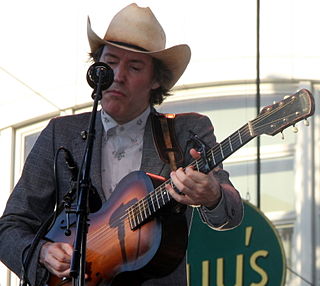
David Todd Rawlings is an American guitarist, singer, and record producer. He is known for his partnership with singer and songwriter Gillian Welch. He and Welch were nominated for the Academy Award for Best Original Song at the 91st Academy Awards for "When a Cowboy Trades His Spurs for Wings" from The Ballad of Buster Scruggs. In 2020, Welch and Rawlings released All the Good Times , which won the 2021 Grammy Award for Best Folk Album.

Rodney Crowell is an American musician, known primarily for his work as a singer and songwriter in country music. Crowell has had five number one singles on Hot Country Songs, all from his 1988 album Diamonds & Dirt. He has also written songs and produced for other artists.

Unearthed is a box set by American country singer Johnny Cash. It was released by American Recordings on November 25, 2003, two months after Cash's death. The album was compiled by Cash and Rick Rubin, who also produced the set. It was certified Gold on December 2, 2004, by the Recording Industry Association of America.
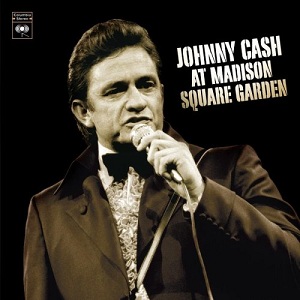
Johnny Cash at Madison Square Garden is a 1969 recording of a Johnny Cash concert at Madison Square Garden. It was released in 2002.
Peter La Farge was an American singer–songwriter.
"Turn! Turn! Turn!", also known as or subtitled "To Everything There Is a Season", is a song written by Pete Seeger in 1959. The lyrics – except for the title, which is repeated throughout the song, and the final two lines – consist of the first eight verses of the third chapter of the biblical Book of Ecclesiastes. The song was originally released in 1962 as "To Everything There Is a Season" on the folk group the Limeliters' album Folk Matinee, and then some months later on Seeger's own The Bitter and the Sweet.

Love, God, Murder is a Johnny Cash compilation box set released in 2000. It features three themed CDs of songs Cash chose from his catalog. Love features relationship songs, mostly written for June Carter Cash. God is a collection of Gospel and spiritual songs. Murder features another recurring topic of Cash's career, and perhaps his favorite subject, but one that he encouraged people "not to go out and do". Each album was also released separately on the same day. In 2004 Life, a fourth compilation was released.

Down from the Mountain is a 2000 documentary and concert film featuring a live performance by country and traditional music artists who participated in the Grammy-winning soundtrack recording for the Joel and Ethan Coen film, O Brother, Where Art Thou? The concert, held at the Ryman Auditorium in Nashville, Tennessee on May 24, 2000, was a benefit for the Country Music Hall of Fame and Museum. The documentary was directed by Nick Doob, Chris Hegedus and D. A. Pennebaker. The artists in the concert also participated in a Down from the Mountain concert tour.
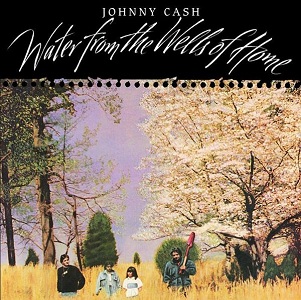
Water from the Wells of Home is the 75th album by American country singer Johnny Cash, released on Mercury Records in 1988. It features several collaborations with other artists, including "New Moon Over Jamaica" with Paul McCartney. Other guests include Waylon Jennings, Hank Williams Jr., Glen Campbell, Emmylou Harris and family members Rosanne Cash, John Carter Cash, June Carter Cash and members of the Carter Family. "Call Me the Breeze" is a J. J. Cale song that had been previously performed by Lynyrd Skynyrd. "Ballad of a Teenage Queen" is a new recording of a song that had appeared on Cash's Sun era album Sings the Songs That Made Him Famous. The album did not fare well on the charts, peaking at No. 48; the two singles, "Ballad of a Teenage Queen" and "That Old Wheel", reached No. 45 and No. 21, respectively. A 2003 re-release of the album contained a bonus track, consisting of Johnny Cash discussing various songs on the album.
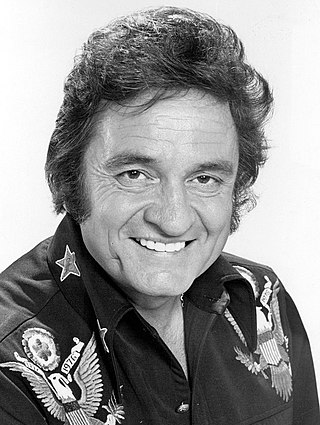
John R. Cash was an American country singer-songwriter. Most of Cash's music contains themes of sorrow, moral tribulation, and redemption, especially songs from the later stages of his career. He was known for his deep, calm bass-baritone voice, the distinctive sound of his Tennessee Three backing band characterized by train-like chugging guitar rhythms, a rebelliousness coupled with an increasingly somber and humble demeanor, free prison concerts, and a trademark all-black stage wardrobe, which earned him the nickname the "Man in Black".

The Allegheny Reservoir is a reservoir along the Allegheny River in Pennsylvania and New York, USA. It was created in 1965 by the construction of the Kinzua Dam along the river. Lake Perfidy comes from Peter La Farge's ballad "As Long as the Grass Shall Grow," recorded by Johnny Cash on his album Bitter Tears: Ballads of the American Indian, which alleged that the reservoir's existence violates the 1794 agreement between Seneca chief Cornplanter and George Washington.
"The Ballad of Ira Hayes" is a song written by folk singer Peter La Farge. Its words tell the story of Ira Hayes, one of the six marines who became famous for having raised the U.S. flag on Mount Suribachi during the Battle of Iwo Jima in World War II. Members of the Western Writers of America chose it as one of the Top 100 Western songs of all time.

Antonino Pasquale D'Ambrosio, is an Italian-American author, filmmaker, producer, and visual artist.
The Americana Music Honors & Awards is the marquee event for the Americana Music Association. Beginning in 2002, the Americana Music Association honors distinguished members of the music community. Six member-voted awards and several Lifetime Achievement Awards are handed out while over 2000 artists, music-loving fans and entertainment industry executives look on.

Kimberly A. Rosen is an American Grammy-nominated audio mastering engineer. Since 2009, she owns and runs a mastering studio in Ringwood, New Jersey.
"Bad News" is a song written by and originally released by John D. Loudermilk, whose version reached #23 on the U.S. Billboard country chart in 1963.
The Country Music Association Awards is a major awards show in country music. Originally presented in 1988 as the Vocal Event of the Year Award, the Musical Event of the Year honor received its current name in 2004. The award recognizes a collaboration of two or more people, either or all of whom are known primarily as country artists, who don't regularly work together as part of a duo or group.
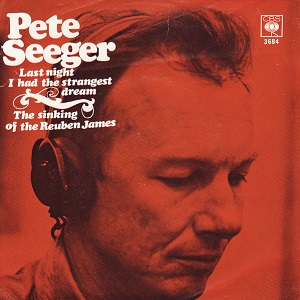
"Last Night I Had the Strangest Dream" is a song written by American folk singer-songwriter Ed McCurdy in 1950. Due to McCurdy's connection with fellow musicians, it was common in repertoires within the folk music community. The song had its first album release when Pete Seeger recorded it as "Strangest Dream" for his 1956 album Love Songs For Friends & Foes. Seeger would later re-visit the song for his 1967 album Waist Deep in the Big Muddy and other Love Songs. The strong anti-war theme of the song led it to be recorded by multiple other artists, including The Weavers (1960), Joan Baez (1962), The Kingston Trio (1963), Simon & Garfunkel (1964), and Johnny Cash who released two versions of the song during the 2000s.














